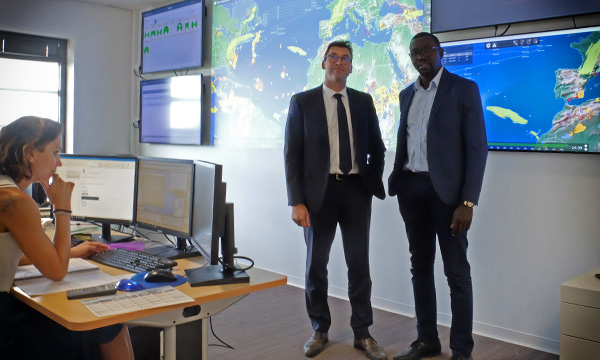With its own OCC, AKKA Technologies is optimizing airlines' flight operations |
| Romain Guillot in Toulouse |
|
|
30 JAN 2020 | 942 words
|
 |
MikaŽl Marsal, Head of Flight Operations Division at AKKA and Mbaye Ablaye, Head of Operations Control Center at AKKA (AOCC). Picture © Le Journal de l'Aviation |
|
|
|
Someone had to think of it. The AKKA Technologies group's aerospace branch has just opened a full Operations Control Centre (OCC) in its brand-new Toulouse premises to take charge of an activity which is usually found at the very heart of airlines. The AKKA Operations Control Center (AOCC) has been fully operational since last year, providing support to the crews of a number of French and foreign operators while optimising their flights. Here's the story behind it.
MikaŽl Marsal, Head of Flight Operations Division at AKKA, says that this activity is part of a new strategy which is being implemented by the engineering and technology group. As a former serviceman with over 15 years' experience in air operations alone as a flight engineer, MikaŽl Marsal remembers that when he joined Aeroconseil's teams, "Flight Ops" in the group at that time essentially meant providing documentary assistance to Airbus then to different airlines, then post-flight safety data analysis. "But I felt that Flight Ops meant getting as close as possible to airlines' operations. The idea grew legs and that's how AOCC was born", he remembers.
Of course, MikaŽl Marsal emphasises that it wasn't quite so simple to launch this kind of project. The first step was to find the right partners and right software solutions to provide operators with the best solutions for them (Jeppesen solutions, eWAS Dispatch solution from SITAONAIR and TDM and so on). "We then needed to create the solution, its different briefing packages and define the added value that we were going to provide to the market, in particular how pilots could save time during briefings and how they could get a handle on their flight plan more quickly", he explains. "We also needed to improve our skills on ETOPS and work under actual conditions with airline pilots to get their feedback on what we were doing. In all, it took us over a year", he specified.
With its restricted access room in a secure building, backed up connectivity, workstations with multiple screens for operations agents, aircraft tracking and real-time world weather display and the position of the day's different tracks over the North Atlantic (and much more), AKKA's OCC looks just like what we're used to seeing at the heart of airlines' own operations. It's clear that AKKA has major ambitions for its OCC which can already accommodate around forty people, meaning that it can manage a fleet with the same number of aircraft.
But MikaŽl Marsal also remembers that one of the difficulties encountered when the Operations Control Centre was set up was related to the fact that the Syntec convention wasn't appropriate for the 24/7 work specific to this type of activity, and new social agreements had to be found.
Rare skills, more than just tools
"People with Flight Ops skills are quite rare and hard to find", says MikaŽl Marsal, who reminds us that eight operations agents are needed for an airline with two planes, but the same number for a fleet of eight aircraft. "We provide this flexibility and this continuity of service, and we can provide a back-up for airlines which want it, with a major level of confidence ".
Jennifer Mazieres-Parťdť, Flight Operations Technical focus point at AKKA, also remembers that before the AOCC was set up and at the request of certain customer airlines, the company had already recruited flight dispatchers who were then placed directly in their own OCCs to cover unscheduled requirements, such as during the main summer rush. "That lasted six months and we quickly realised that in the end the airlines wanted to recruit our agents, but that it could also mean new services for us to offer", she says. She also reminds us that the flight dispatcher's job is a very restrictive one, that there is a high level of turnover, and that there is little dedicated training. "We have a partnership with French …cole nationale de l'aviation civile (ENAC) to get the best resources, with qualified agents, which is a mark of trust for customer airlines", she emphasises.
The OCC, a first step?
"What we are seeing on the whole for French airlines and European airlines more generally is that the balance point between a positive financial result and a negative result is extremely fine. These airlines are exposed to a high number of external factors which impact their results", explains Pierre-Yves Lazies, Vice President Aircraft Support & Operations at AKKA.
In particular, he mentions regulatory issues, fuel price volatility, new taxes and the potential effects of "flygskam". He continues: "Small and medium-sized airlines, who are our targets, are particularly exposed to these factors. Our analysis is that these airlines need to focus on their aircraft' operations, on marketing and on selling tickets, as everything else are additional constraints that need to be managed, with significant variations in load depending on the season".
We can see the reasoning behind the AOCC, especially as it could be the first stone of a much larger building, once combined with the other skills on offer at AKKA's Aircraft Support & Operations Division. "We've done 80% of the work we need to expand our portfolio of offers that we can provide for airlines' core activities", states Pierre-Yves Lazies, who mentions for example the possible setting up of an MCC (Maintenance Control Centre) and its logistical aspects, an activity which generally has a direct link to an OCC in an airline's day to day operations. MikaŽl Marsal adds that airlines are particularly seeking support for ground operations such as handling or PN support.
|
|
 |
Romain Guillot
Chief editor
Cofounder of Journal de l'Aviation and Alertavia
|
|
| |
They made this section possible |
|
|
|
|
|
|
|
|
|
|
|
|
|
|
|
|
Top stories |
|
|
|
|
|
Top stories
|